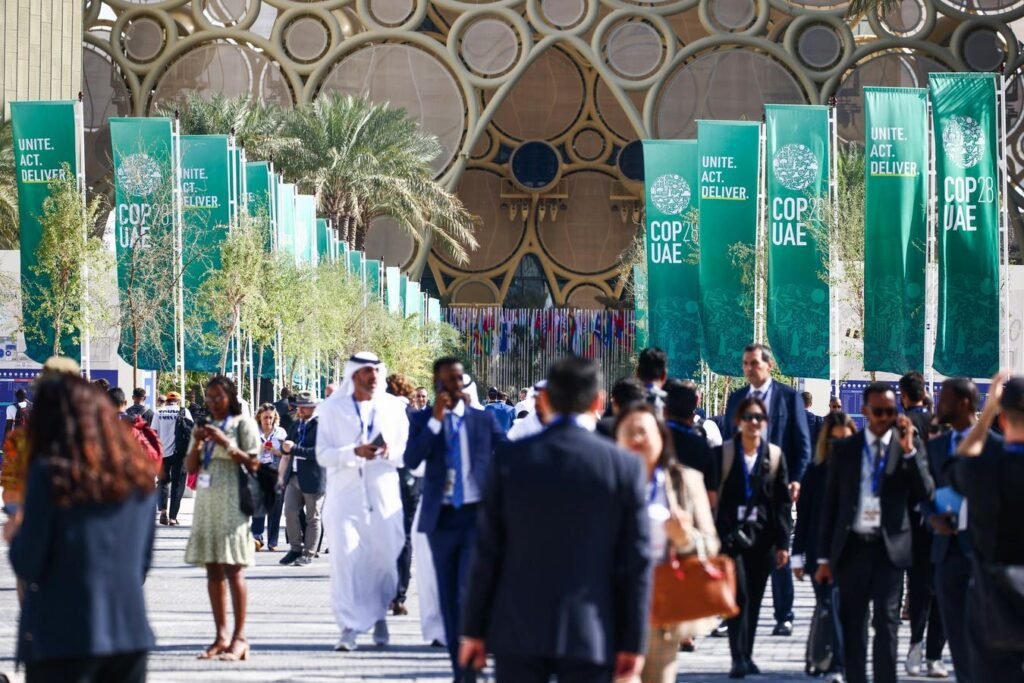COP28 takes place until December 12, 2023 in Dubai.
NurPhoto via Getty Images
The world’s biggest carbon polluters are meeting at the COP28 global climate summit this month in Dubai amid growing concern that they are not moving fast enough to slow and reverse emissions that are changing weather patterns and warming the planet. Even so, one member of the US delegation said it had a positive message for the country’s overall progress in clean energy and efforts to curb industrial CO2 emissions.
“We’re actually, in these kinds of hard-to-decarbonize projects, further along this decade than I would have expected we would have been a few years ago,” said White House climate adviser Ali Zaidi. . Forbes. “And that’s a great setup for us to chase these shows into the next decade and the decade after that.”
Zaidi, who is accompanying Vice President Kamala Harris to Dubai, pointed to positive developments in the US that could prove influential in other nations without detailing specific new programs.
“The story of this COP is ‘its implementation time,'” he said. “We’re putting steel in the ground. We have learned a lot from this. And so we will come to the table to help others implement it at an accelerating pace and increasing ambition over time.”
After reversing the Trump administration’s decision to abandon carbon reduction efforts set by the Paris Agreements in 2015, President Joe Biden has prioritized US participation in the annual conference of the parties (COP) again starting in 2021. Since then, his administration launched a series of initiatives to scale up renewable energy, hydrogen production and carbon capture, and funded incentives for manufacturers to build electric cars and batteries in the US and for consumers to buy them.
“We’re putting steel in the ground. We have learned a lot from this. And so we will come to the table to help others implement it at an accelerating pace and increasing ambition over time.”
Last year, “we were coming off of passing the biggest climate bill not only in the history of the US but in the history of the world, the Inflation Reduction Act,” Zeid said. “We’re emerging now, a year later, essentially having begun to do the work of implementing, the work of building the clean energy solutions that we need. Since the IRA was signed, we’ve seen over 100 clean energy plants announced.”
The annual summit, held for the first time in the oil-rich United Arab Emirates, comes as scientists predict 2023 will rank as the the hottest year on record. So far, wealthy nations and charities, including the Gates Foundation at COP28, have announced plans to contribute hundreds of millions of dollars to new international fund to help poorer countries hit by hotter temperatures and more extreme weather, although the total is likely to fall far short of the hundreds of billions of dollars needed. Compounding the problem, the US this week also estimated that global CO2 emissions will likely continue to rise until 2050.
However, US emissions may decline 3% in 2023, helped by continued declines in the use of coal to generate electricity, the Energy Information Administration said last month. And Zaidi believes the world’s largest economy will continue to move the needle on massive CO2 emissions, helped by growing sales of electric vehicles, increased installations of renewable energy systems and a new federal push to dramatically increase the production and use of clean of hydrogen — especially help in the manufacture of low-carbon steel, cement, aluminum and asphalt.
“I have somewhere in my messy office a piece of steel that was forged without CO2,” he said. “This is no longer fantasy. It’s something that people can produce and it’s because of things like green hydrogen.”
